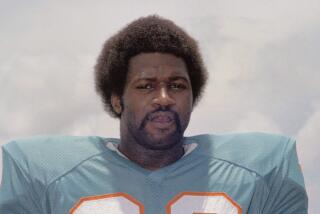‘Thin Blue Line’ Director Wins $260,000 Grant
- Share via
Errol Morris, whose 1988 film “The Thin Blue Line” was instrumental in freeing the innocent Randall Dale Adams from prison after 13 years, will use part of the $260,000 he was awarded this week from a MacArthur Foundation fellowship to resume production on the documentary he abandoned four years ago to concentrate on Adams’ story.
In 1985, Morris was filming “Dr. Death”--a documentary about infamous Texas psychologist James Grigson, whose testimony has helped send 27 men to Death Row--when he stumbled on Adams, who was convicted for the 1977 murder of a Dallas police officer.
Adams’ case intrigued Morris, and he eventually quit “Dr. Death”to champion Adams. By combining testimony and stylized dramatizations, Morris carefully reconstructed the events surrounding Adams’ wrongful conviction.
The resulting film, “The Thin Blue Line,” uncovered evidence that led to Adams’ release in March. The film was named best documentary of the year in 1988 by the New York Film Critics Circle, the National Board of Review and the Boston Film Critics.
“The purpose of ‘The Thin Blue Line’ was not just to tell a story about something that happened in the real world, but to explore our perception of the world,” Morris, 41, said Tuesday from his home in Cambridge, Mass. “The film focuses on what people thought happened, the various diverse accounts given of the crime, and their beliefs about why it happened. The crime did happen, but not the way people thought it did.”
The Chicago-based MacArthur Foundation presents the so-called “genius” grants annually, based on creativity and career promise. Recipients may use the money, awarded over a five-year period, in any way they see fit to advance American art and science. This year, foundation President Adele Simmons awarded 29 prizes totaling $8 million.
“ ‘The Thin Blue Line’ has helped draw an enormous amount of attention to me,” Morris said. “I’m very proud of this movie, and the role the movie and I have played in this case in Texas--namely in securing Randall Adams’ release from prison.”
Attention of a different kind was focused recently on Morris, however, when Adams filed a lawsuit to reclaim the rights to his life story, which he had signed over to Morris for “The Thin Blue Line.” Morris said that the case, scheduled to be heard in a federal court this month, will be avoided by a settlement.
“We’re trying very hard to resolve all of this. I plan to give Randall Adams the rights back,” said Morris, who hopes the act will help r-eestablish the close friendship the two men once shared. “My intention has never been to deprive Randall of the opportunity to make money on his life story. Since he wants them back, I will give them back.”
Morris, who also won a $27,000 Guggenheim Fellowship this year, has made two other critically acclaimed documentary films: 1978’s “Gates of Heaven,” which documents the success and failure of two California pet cemeteries, and 1981’s “Vernon, Florida,” about small-town residents who pass the time turkey hunting, worm grunting and sand growing.
In “Dr. Death,” a study of violence and aggression, Morris said he will juxtapose Grigson’s comments with those of a lion tamer.
“I like to believe that I’ve created a new style of nonfiction, documentary film making,” he said. “The style itself challenges many of the basic assumptions that we have about nonfiction film making and about journalism. I don’t use hand-held cameras or zoom lenses, and I don’t rely on available light. My documentaries are constructed more like dramatic feature films.”
Morris said that he hopes to begin production soon on his first dramatic feature film, “The Trial of King Boots,” about the true story of a sheep dog in Detroit that was brought to trial for murder.
Related stories on Page 3 and in Metro
More to Read
Only good movies
Get the Indie Focus newsletter, Mark Olsen's weekly guide to the world of cinema.
You may occasionally receive promotional content from the Los Angeles Times.










